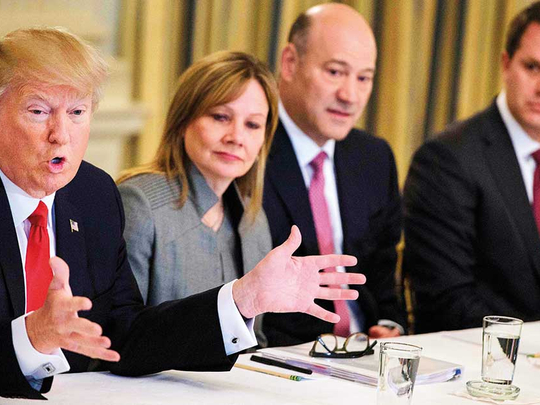
New York: Wall Street traders spent the first half of the year bemoaning zonked-out markets. Some of them wish those days were back.
With headlines on Donald Trump’s dramas going off like firecrackers, volatility has surged. The S&P 500 has spent days flip-flopping before ending the week 0.7 per cent lower as stress indexes hover near the highest levels of the year.
The drop over the five days brings the two-week decline in the benchmark gauge to 2.1 per cent, the biggest back-to-back loss since just before the US election. Pain was pronounced in small-cap shares, with the Russell 2000 Index down 1.2 per cent for the third straight weekly slide.
“It’s not wise to trade this,” said Ian Winer, director of equities at Wedbush Securities Inc. “The second investors become experts in politics, they get the market wrong.”
Just Friday, the Dow Jones Industrial Average reversed losses and surged 150 points on news Stephen Bannon is exiting his role as chief strategist. Then it went back down. For investors accustomed to welcoming Trump’s every utterance, lately it’s been a matter of getting out of their way.
“Unlike the central banks which have a set calendar events, these political events can happen at any time,” Stewart Warther, an equity derivatives strategist at BNP Paribas in New York. “The timing is unknown.”
Picking a direction and staying with it, a strategy that worked almost perfectly since Election Day with the S&P 500 up in eight of the nine months, has been less of a sure bet. In the past two weeks, traders watched as Trump warned North Korea against nuclear aggression, disbanded two advisory councils, and saw Bannon ousted.
Speculation Thursday that Gary Cohn would quit as economic adviser — later refuted — contributed to a 274-point Dow plunge.
“Just as fast as this thing goes up on the rumour, it goes down when that rumour is not delivered. That’s not type of investing we want to do,” said Adam Calamar, portfolio manager who helps oversee $7.6 billion at Jensen Investment Management Inc. in Lake Oswego, Oregon. “Things can change so rapidly in Washington.”
Policy initiatives
For investors waiting for the smoke to clear and Washington to get back to work, the drumbeat of drama has been frustrating, if not decisive. Business will adapt, they say, and getting too hung up on the president’s agenda was probably a mistake to begin with.
“We really haven’t had many policy initiatives — no health care, no infrastructure, and no taxes,” said Mark Kepner, managing director and equity trader at Themis Trading LLC in Chatham, New Jersey. “What Trump was doing by reaching out to all these CEOs was the right thing to do but those CEOs aren’t going to just stop trying to grow their business now.”
However hard it is to process Trump headlines, traders did a pretty good job of it, going by their results. Data compiled by Bloomberg show they’ve been pouring money into momentum stocks for the last three months, and that style just had the best week among the biggest investment factors followed by Bloomberg.
And if bulls survived the week, bears must have embraced it. With short interest near the highest level this year, a Goldman Sachs basket of the 50 most heavily shorted stocks in the Russell 1000 lost almost 2 per cent for the third straight week.
“Last week and this week are two crazy examples when political headlines roil markets,” Robert Parks, managing director in equity derivatives at RJ O’Brien and Associates LLC, said by phone. “You should at least be buying protection here.”












